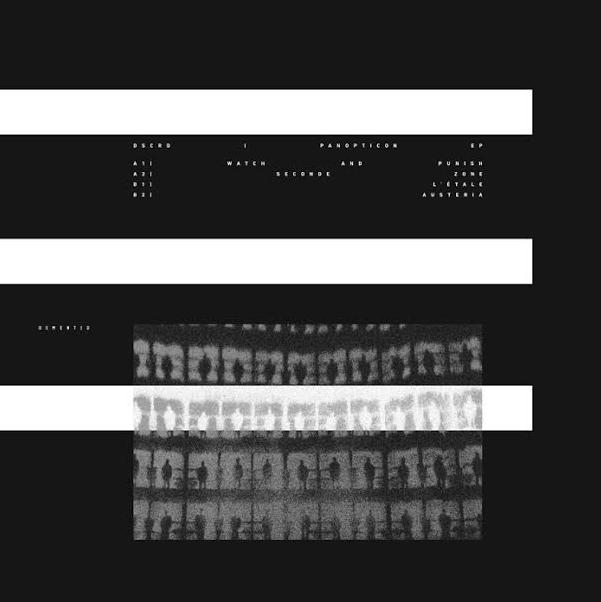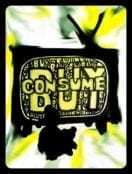[dropcap style=”font-size:100px; color:#992211;”]O[/dropcap]ne of the more distinctive recent electronic releases is Dscrd‘s Panopticon, which consciously breaks some of the conventions of electronic music, while also introducing a thoughtful political and philosophical aspect.
The EP was produced using newly-coded software and vintage bass guitar amps, a far cry from standardised pre-sets and an over-reliance on tried and tested sounds. Alexei Monroe spoke to the five-piece group about the EP and their work.
The press release describes your work in these terms: ‘their productions are the results of a slow and nondeterministic process where ethnicity, noise violence and complex rhythms are convergent paths’. What role does ethnicity play and can you describe your basic creative approach and working methods?
Dscrd: We mentioned ethnicity and it’s been a mistake. We actually meant ethnomusicology : the study of music through a social point of view, in different cultures, generally categorised as world music.
[quote]in daily life, we live in a
comfort that resembles a prison[/quote]
We are fascinated by non eastern approaches of the music and sound making, which often leads to extremely intense social experiments. This music make the listener focus on something else than aesthetic and references, and push him to censor deeper or simpler life events.
The work of Gilles Deleuze and Felix Guattari has been a strong influence on electronic music for at least two decades, but as far as I know this is the first example of Michel Foucault’s theories being used in this way. Why is your style of music an appropriate vehicle for Foucault’s ideas about surveillance and punishment and what do you find inspiring in Foucault’s work?
Dscrd : For us it was a perfect way to relate a lot of different things, the lack of imagination in music in general tends to be a form of confinement but also in daily life, we live in a comfort that resembles a prison.
Of course, Foucault’s theories are about how people’s minds are evolving around the idea of prison incarceration, but there was this thing about panopticism where a few people control an entire group of persons which is obviously something we can transpose in our lives. That was the main idea but we left it open and tried not to get stuck, that’s why you can find songs as different as ‘l’Etale’ and ‘Watch and punish’ on this EP!
Presumably ‘Austeria’ is meant as a comment on contemporary political/economic realities in Europe? Could you say more about this?
Dscrd : Some of us are really interested in the topic of economy, a pretty popular one lately. It’s always [the case that] you’re making a track and you think about a name. Some people react more poetically, have nice abstract or artistic concepts, create an imaginary world or whatever. We do not have any of this. We’re sound makers and we make music, and we’re more concerned about our concrete present than abstractness.
One day you think about some political shit and your music becomes part of it. ‘Austeria’ is the aftermath of political concerns, during a shitty rainy afternoon, a constant shift between newspapers, economy blogs, and music software.
Can you talk more about the political aspect of your work?
It would sound too ambitious or obvious to talk about political messages, this is really not the main point, although we think that completely disconnecting music making and sound art from its social context is also a problem.
We’re not exposing political ideas, we just make use of political symbols to enrich the music experience and its narrativity, to enhance ideas behind a piece of music. We start with an observation and use it to compose, we are watchers trying to share a certain vision.
Do you think that contemporary electronic music is generally too apolitical or do you sense a new re-politicisation?
Dscrd : We can observe very few political statements on the electronic music scene, and it seems like a drop in the ocean, they are actually mostly people who reject their belonging to the [music] industry. We guess there’s an overall deception about the classic vision of politics and militancy among the youth.
Paradoxically, the more you grow in the scene the more you get involved into some kind of political forces: labels , interviews , promotion and events.
Globally we could say people (at least in France) are shy of making political statements, it’s the opposite of the hipster way of being cool, it’s not really seen as a way to enhance musical diversity and its goals.
D S C R D – P A N O P T I C O N E P
Format: Vinyl & Digital
Label: DEMENT3D RecordsCat n°: DM3D07
Tracklist:
A1. Watch and Punish
A2. Seconde Zone
B1. L’Etale
B2. Austeria

From Speak and Spell to Laibach.


















